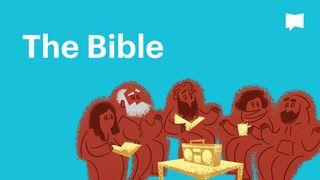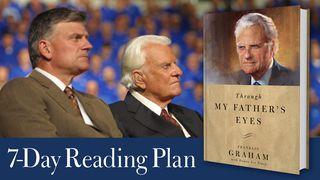The Bible with Nicky and Pippa Gumbel, Classic Version, 2017Sample

How to Love
Four bullets hit Pope John Paul II – two of them lodging in his lower intestine, the others hitting his left hand and right arm. This assassination attempt on the Pope in May 1981 left him severely wounded and with considerable blood loss – his health was never the same again. In July 1981 the perpetrator, Ali Aƒüca, was sentenced to life imprisonment. Pope John Paul II asked people to pray ‘for my brother Aƒüca, whom I have sincerely forgiven’.
Two years later, he was to take the hand of Ali Aƒüca, then in prison, and quietly tell him that he had forgiven him for what he had done (even though his would-be killer had not asked for forgiveness). He developed a friendship over the years, meeting Aƒüca’s mother in 1987 and his brother a decade later. In June 2000 Aƒüca was pardoned by the Italian President at the Pope’s request. In February 2005 Aƒüca sent a letter to the Pope wishing him well. When the Pope died on 2 April 2005, Aƒüca’s brother, Adrian, gave an interview saying that Aƒüca and his entire family were grieving and that the Pope had been a great friend to them.
Pope John Paul II’s response of love and mercy is exemplary. God’s love and mercy is even more extraordinary because ‘At the cross of Jesus, pardon is complete. Love and justice mingle, truth and mercy meet.’
Psalm 40:9-17
1. Love and truth
Jesus personified God’s love but he also said, ‘I am… the truth’ (John 14:6). The Holy Spirit pours God’s love into your heart (Romans 5:5) but is also the Spirit of truth (John 15:26). Truth becomes hard if it is not softened by love; love becomes soft if it is not strengthened by truth.
David says, ‘I do not conceal your love and your truth’ (Psalm 40:10c). He prays, ‘may your love and your truth always protect me’ (v.11b). He does not see love and truth as mutually exclusive in any sense, but rather as complementary. The truth about God is that he loves you, he is righteous and faithful and he brings justice upon the earth.
As love and truth go together, so do justice and mercy. The concepts of righteousness (as in v.10) and justice are very closely related in Scripture. In this passage, it is on the basis of his knowledge of God’s righteousness that David pleads for God’s mercy: ‘Do not withhold your mercy from me, O Lord… my sins have overtaken me, and I cannot see’ (vv.11a,12b). Sin blinds us. We need God’s mercy and forgiveness so that we can see clearly.
Lord, may your love and your truth always protect me.
Luke 9:28-56
2. Love and mercy
Have there been mountaintop experiences of the presence of God in your life when you have felt extraordinarily close to Jesus? This passage begins with such an experience.
Jesus takes Peter, John and James on to a mountain to pray. As Jesus is praying, they see him transfigured before them. They see his glory (v.32). Peter says to Jesus, ‘Master, this is a great moment!’ (v.33, MSG). They become ‘deeply aware of God’ (v.34, MSG). They hear God say, ‘This is my Son, whom I have chosen; listen to him’ (v.35).
However, like the disciples, who ‘came down from the mountain’, there comes a time when you too must descend (v.37). Mountaintops inspire us, but valleys mature us.
The tough realities of life awaited the disciples at the bottom – failure in their ministry, lack of understanding and rivalry. But the experience of the mountain can help you to see your life down below in a new and different way.
Jesus calls his followers to a love that is all embracing. He calls you to welcome people: ‘Whoever welcomes this little child in my name welcomes me; and whoever welcomes me welcomes the one who sent me’ (v.48). Welcome people regardless of what they can do for you.
How you welcome people really matters. Some people are warm and welcoming, others are not. Some churches are warm and welcoming, others are not. I have been hugely inspired by Hillsong church and the welcome they give to every person who arrives at their services and conferences. They seem to have a profound understanding that in welcoming people, they welcome Jesus. And in welcoming Jesus, they welcome the one who sent him.
John said, ‘We saw someone driving out demons in your name and we tried to stop him, because he is not one of us’ (v.49). Jesus replied, ‘Do not stop him… for whoever is not against you is for you’ (v.50; cf. Luke 11:23). Accept people beyond your own immediate circles, denomination and traditions. If they are not against Jesus they are for him. Welcome them as such.
On the other hand, do not be surprised if you are not always welcomed. Even Jesus was not always welcome. As Jesus resolutely set out for Jerusalem he sent messengers ahead of him who went into the Samaritan village to get things ready for him, but the people there did not welcome him (9:51–53).
My immediate response to not being welcomed would be similar to that of James and John – to seek revenge. When the disciples saw how Jesus was treated they asked, ‘Lord, do you want us to call fire down from heaven to destroy them?’ (v.54). However, revenge is not the right response: ‘Jesus turned and rebuked them’ (v.55).
Jesus, who is the truth and who was to take God’s justice on himself on the cross, shows us what it means to love even our enemies and have mercy on them.
Lord, help me to love, like Jesus, in an all-embracing way. Help me never to seek revenge but to extend mercy and love even to my enemies.
Numbers 35:1-36:13
3. Love and justice
The whole of Israel’s national life was directly governed by God. It was operating in a very different world to our own. Some of the laws do have a universal application. Others were specific to Ancient Israel. Here we see the beginnings of a code of legal practice that was specific to Ancient Israel.
Capital punishment for murder was an expression of the sanctity of human life (Genesis 9:6). It was because the taking of a human life was so serious that the penalty needed to be so severe. This was a society in which the alternative – life imprisonment, for example – was not really practical.
We see that a distinction was made between murder ‘with malice aforethought’ (Numbers 35:20) and what was effectively manslaughter (‘without hostility’ and ‘unintentionally’, v.22). We see the beginnings of the right of trial by jury – that is by the people. Those accused of a crime are to ‘appear before the community in court’ (v.12, MSG). ‘The community is to judge’ (v.24, MSG).
‘The avenger of blood’ (v.19) was not taking private vengeance. The matter had to be brought before the court (‘the assembly’, v.12) by more than one witness and the decision was made by the court. There had to be really good evidence (v.30). There must be no bribery (v.31).
The New Testament makes a distinction between the dealings of the state and personal morality. Governing authorities are established by God and ‘the one in authority is God’s servant to do you good… They are God’s servants, agents of wrath to bring punishment on the wrongdoer’ (Romans 13:4). The state is concerned with the protection of others. To stand by and allow injustice would actually be unloving and unchristian. It would be to allow evil to go unchecked, and to ignore the pain of the victims.
Yet, in personal morality we are told, both by Jesus and the apostle Paul, not to take revenge (Matthew 5:38–42; Romans 12:17–19). This attitude of love and forgiveness is not to deny justice, but rather it is an expression of trust in God’s ultimate justice (see Romans 12:19). As we trust in God’s justice, we are empowered to imitate his love. As Miroslav Volf writes, ‘The practice of non-violence requires a belief in divine vengeance.’ He explains that when we know that the torturer will not eternally triumph over the victim, we are free to rediscover that person’s humanity and imitate God’s love for them.
The distinction between our own morality and that of the state creates a tension within us all. We are all individuals with a command from Jesus not to retaliate or take revenge. We are also citizens of the state with a duty to prevent crime and bring wrongdoers to justice. It is not easy to hold this tension, but an attitude of love requires that we do. Our motive should always be love and justice, not retaliation or revenge. In every situation we need to act with an attitude of love.
Lord, help me to combine a passion for truth and justice with an attitude of love and mercy.
Pippa Adds
Luke 9:46–48
I can’t believe we are back on them arguing again about who is the greatest. I’m not particularly competitive, but I was very thrilled when my cholesterol turned out to be 5% lower (and therefore better) than Nicky’s!
About this Plan

Start your day with the Bible in One Year, a Bible reading app with commentary by Nicky and Pippa Gumbel. Nicky Gumbel is the Vicar of HTB in London and pioneer of Alpha. 'My favourite way to start the day.' - Bear Grylls, Adventurer
More
We would like to thank Nicky and Pippa Gumbel, HTB for providing this plan. For more information, please visit: https://www.bibleinoneyear.org/









